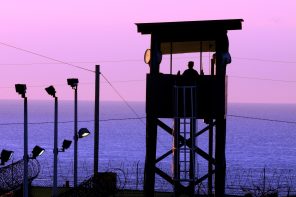Why I oppose the Khadr settlement.
Let’s begin with what we can all agree on: torture is unequivocally cruel, and the Bush administration’s use of it represents an ugly phase in American antiterrorism policy. I offer no excuses for the use of this heinous practice. Additionally, the fact that Omar Khadr, by age fifteen, had been inculcated with radicalism, hatred, and violence, is a tragedy in and of itself. His father’s actions ruined his life by guiding him into terrorism. I do not seek to minimize either the horrors of torture or the tragic fact that Khadr was young at the time of his actions.
Last week, the Liberal government, claiming that Omar Khadr’s rights were violated to an ostensibly extreme extent, issued an apology and paid him $10.5 million. While from a legal perspective, this process was permitted, that does not diminish its immorality. It strikes me not just as regretful that the government made this payment, but as insulting to the armed forces and to the family of Sergeant First Class (SFC) Christopher Speer, the victim of Khadr’s actions.
Above any other argument against the settlement is the basic notion that terrorists who target and kill American soldiers do not deserve to cash out. In 2010, Khadr pleaded guilty to a myriad of charges, including the murder of SFC Speer, the attempted murder of other servicemembers, conspiracy, spying, and providing material support for terrorist organizations. His admission to the crimes through a plea illustrates that Khadr is indeed guilty. In fact, a leading psychologist’s testimony reveals that Omar Khadr, by his own admission in 2015, threw the grenade at SFC Speer and the American troops accompanying him on duty. Khadr stated to the psychologist, “I had a hand grenade. I threw it over my back and it exploded. I wanted to scare them away. I wasn’t thinking of the consequences… I still take responsibility.” The notion that Khadr didn’t know what he was doing is questionable at best, but this statement still serves as an admission of guilt. Just last week, Khadr reiterated in relation to his actions, “I’m not excusing it, I’m not denying it.”
The fact that Omar Khadr, by age fifteen, had been inculcated with radicalism, hatred, and violence, is a tragedy in and of itself.
While his action stemmed both from a place of fear and brainwashing, its consequences were grave. SFC Speer, a Special Forces medic, tragically perished. During his lifetime, Speer exemplified the heroism by which we know our armed forces. Just weeks before his killing, Speer dashed into a minefield to rescue two injured Afghan children, a brave action that demonstrated his dedication to others. He left behind a wife and two children, now husbandless and fatherless respectively, due to Khadr’s actions.
Khadr was a minor at the time of his offense, and this is often held as a reason why he deserves repayment from the Canadian government. While certainly it did play a factor in lessening his decision-making ability, the choice to lob a grenade at a group of people is one done with the knowledge of potential impacts. By age fifteen, most individuals know that a grenade is a powerful weapon capable of killing or maiming others. Excusing his actions because of his youth at the time is a deeply faulted argument.
I agree that there should be some sort of apology for the methods used at Guantanamo, and I can understand why Khadr was allowed to post bail and has now been released. But taxpayers should not have to foot the bill for additional recompense, especially to the exorbitant tune of a seven-figure sum. The sheer size of Khadr’s payoff insults Canadian soldiers. While Canadian veterans maimed in combat receive a lump-sum payment capped at $360,000, Omar Khadr, who killed a soldier, is set for a comfortable life with $10,500,000 in his bank account. Even if Khadr underwent mistreatment in Guantanamo, what qualifies him to receive nearly thirty times the amount that injured soldiers receive?
Proponents of the payment argue that it sets a strong precedent in opposition to torture, but there are far better means of dissuading inhumane treatment. The release of the CIA’s torture dossier in 2014, urged by Democrats in Congress, brought light to the nature of the Bush administration’s misdoings in Guantanamo and generated a powerful public backlash. Former US Supreme Court Justice Louis Brandeis once stated, “Sunlight is the best of disinfectants; electric light the most efficient policeman.” Transparency is the first step in preventing torture from occurring again.
Instead of paying sums to terrorists, the American and Canadian governments should pursue other channels of action against torture.
Shining a light on the CIA’s terrible methods is a way to acknowledge that wrong was done without ensuring that convicted terrorists live an opulent lifestyle. In 2014, for example, US Senator Ron Wyden of Oregon introduced a bill to beef up US anti-torture laws and add accountability measures to ensure that atrocities do not occur again. Instead of paying sums to terrorists, the American and Canadian governments should pursue other channels of action against torture.
While there’s no question that Omar Khadr was mistreated at Guantanamo, I find no legitimate reason for him to be handed millions of Canadian taxpayer dollars. Nobody in good conscience should support torture, but neither should they support the conclusion that a convicted terrorist deserves a massive handout.





